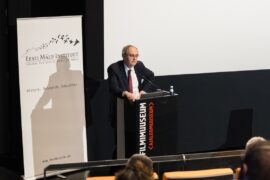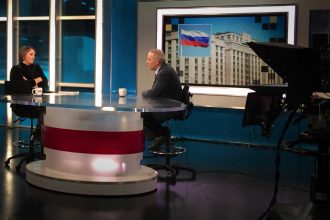
Juuso Salokorpi (editor): The Arithmetic of the Greatness of Ilmari Susiluoto
Helsinki. 2020. 413 pages.
The twists and turns in the career of Russian researcher Ilmari Susiluoto (1947 – 2016) are themselves a reflection of Finland’s traumatic relationship with Russia. He was an independent researcher and a presidential advisor who became mired in the bureaucratic politics of Finland’s relations with its Eastern neighbour.
Well-known Russian scholars, Soviet trade veterans and journalists take a retrospective look at his career in a memoir titled “The Arithmetic of the Greatness of Ilmari Susiluoto”. The book has been edited by Juuso Salokorpi, Ilmari’s cousin and schoolmate, who was once an international banker in Moscow and London.
1960
In the mid-19th century, Susiluoto was a board member of the Helsinki New Left Schoolboys and Schoolgirls
Society. Several Finnish left-wing politicians and intellectuals emerged from this famous association. But he
maintained (kept) his intellectual and critical freedom, when most of this group betrayed the ideals of “the generation of 1968” accepting communist ideology or careers in service of advancing finlandization.
In 1982, his book, “The Origin and Development of System Thinking in the Soviet Union” which focused on the early

stages of Soviet cybernetics, a policy that was internationally regarded as being bold and innovative, was even noted by Alec Nove in “Soviet Studies”. The issue of cybernetics was politically sensitive in The Soviet Union, because it was invented by Lenin’s opponents Anatoly Bogdanov and Nikolai Bukharin. They presented an alternative to Stalin’s “barrack style” communism with early Soviet cybernetics, and predicted Norbert Wiener’s theories that appeared in the West, 50 years later.
The challenges of a planned economy provided a peculiar perspective on cybernetics. Cybernetic socialism was accused of being too technocratic. Bogdanov’s and Bukharin’s theory of equilibrium threatened the party’s leading role.
The issue was important in the 1970s as the Soviet Union was frozen by inefficiencies and waste, and governance was reduced to data processing. In an effort to reform the economy in the 1960s, it was expected that cybernetics would help with the process.
Susiluoto returned to radical cybernetic ideas 20 years later, during perestroika. But it was too late. Or did it just become clear that the command economy could not be repaired?
Methodologically, Susiluoto modeled his work on the internationally acclaimed book Inkavaltio by Rafael Karsten, a classic of Finnish sociology. The subtitle of this English translation, “A Study of a Totalitarian State,” stated that the Inca state was ruled over by priests and was useful in understanding the Soviet system.
From 1982, Susiluoto worked at Finland’s Ministry for Foreign Affairs, first as a special investigator in the Finnish-Soviet Cooperation Committee and then in the Trade Policy Department. He was also the secretary of the Sovietology Working Group at the Institute of Foreign Policy.
The Pugwash movement, founded by Bertnard Russell and Albert Einstein, helped scientists work together against the nuclear threat. Professor Jorma K. Miettinen, a Finnish nuclear physicist, was a notable figure in the movement. Susiluoto was Finland’s second representative and the secretary of the Finnish Pugwash Committee until 1989.
Susiluoto’s research was used by President Mauno Koivisto and worked for the Perestroika Group which was organized by Koivisto in 1989 to monitor the Soviet economy. This was a follow-up to a group of experts who had initially monitored Hungary’s economic reform.
The Soviet economy was slightly less combustible than the power structure that ruled it. True, there were doubts here as well, and Koivisto stated: “By cracking the lid open now, something might be revealed that requires us to quickly close it.”
The group acknowledged that the Soviet economic system had spun out of control and that political polarization had reduced government support.
Koivisto cautioned Mikhail Gorbachev, economical reform was economically inevitable, but politically impossible.
Koivisto pretended to follow the Soviet economy, but in fact he secretly hoped that perestroika would neutralize the existential threat that the Soviet Union posed to its smaller neighbors.
Estonians and some Finns have also resented Koivisto’s unforgivable attitude towards the Baltic independence movement. However, his motives were unknown: despite the veneer of friendship, the frontline veteran Koivisto considered Russia / the Soviet Union to be an eternal aggressor that would forever threaten smaller states. He was still concerned in the 1990s, that Finland would drop its guard, when younger generations who had not experienced war, emerged to lead Finnish politics.
Susiluoto prepared weekly reports on the situation in Russia for President Martti Ahtisaari. In 1998, he wrote 25 dramatic memoranda on northern Russia and the Karelian question.
Susiluoto was interested in the regionalization of northern Russia. The Republic of Komi seemed to be of particular economic and regional interest. He also probed the situation on the ground and took initiatives to activate the region’s development potential.
Finland held talks on a framework for cooperation with the President’s representative for the Komi Republic, Alexander Popov, which was of interest to the Head of the Komi Republic, Yuri Spiridonov.
Susiluoto also acknowledged that the identity of the Finno-Ugric peoples is on the rise. He emphasized that the Finno-Ugric world is important to Finland and a significant part of the Finnish identity.
Susiluoto also participated at important turning points in history, such as when world peace was threatened by the Kosovo crisis. Ahtisaari used Susiluoto several times and even delivered the Russian conditions of peace from Moscow at the time and participated in the analysis of them.
1999
In the spring of 1999, Susiluoto, received word from Petrozavodsk that Russian President Boris Yeltsin would dismiss Prime Minister Yevgeny Primakov. Susiluoto informed Ahtisaari, who informed Strobe Talbott. When Primakov prevented the Kosovo crisis from being resolved, this bloody hint from Finland broke free the situation in the cul-de-sac. The Eastern Department of the Ministry of Foreign Affairs heard of it later, which provoked internal hostility inside the ministry towards Susiluoto.
The well-known Russian propagandist, Johan Bäckman, targeted Susiluoto as early as 1996, when he had published the book “Russia – a Giant Wind Ride”. The book was remarkable, nothing as revealing had been published about current Russian robbery capitalism in Finland at the time.
Bäckman accused Susiluoto of having nothing positive to say about Russia, only negative abuse and slander. The University of Helsinki even gave Bäckman and Professor Markku Kivininen the opportunity to host a seminar on post-Finlandization, where any direct discussion of Russia’s problems was labelled as Russophobic.
Bäckman targeted Susiluoto and complained about him to the Foreign Ministry. Erkki Tuomioja wrote in his diary “I don’t think there were any injuries from yesterday ” (2018, p. 596) immediately after becoming Foreign Minister, when he discussed Susiluoto’s writing with senior Foreign Ministry officials Jukka Valtasaari, René Nyberg and Pertti Torstila and accused Susiluoto of anti-Russian racism.
Other leading officials joined in on the accusations, while Susiluoto’s position as a researcher reporting directly to Ahtisaari, had irritated them.
Susiluoto’s research was not limited to Kremlin-controlled materials, but he also used opposition material. There were concerns that this would damage Finland’s relations with Vladimir Putin’s government. Included among Susiluoto’s apparent sins was the publication of a collection of Russian jokes and a book about Karelia.
Thus, it was decided to dismiss Susiluoto from the Ministry of Foreign Affairs. Shocked by the Kafkaesque process, he was hospitalized. After his lawyer intervened, he was placed as a researcher at the Alexander Institute.
In his diary “I Confess I Fear the Worst” (2019), Tuomioja talks about how he participated in an event organized by the Bäckman and The Alexander Institute on December 17, 2002, where Nikolai Baryshnikov’s Stalinist historical work “Leningrad’s Border and Finland 1941-1944” was presented.
Tuomioja met with Bäckman in the hallway and wrote (p. 452): “I took the opportunity to tell Mr Bäckman that my participation in the event demonstrated that we in the Foreign Ministry do not have any negative attitudes towards criticism and harbor no anti-Russian sentiments. Susiluoto is sui generis and the ministry must not be criticized because of him, but in turn I hope that Bäckman can also drop all complaints against the foreign ministry.”
It is a pity that the Susiluoto’s dismissal was not discussed in court. It would have been interesting to see the court’s assessment of propaganda concepts, such as “anti-Russian racism”, “anti-Russianism”, “Russophobia” and “extremism”.
Susiluoto left the Ministry of Foreign Affairs at a time when the Finnish elite was viewed Bäckman with childishly naivety, as well as Russia’s gas pipeline deals, dual Finnish and Russian citizenship and Russian real estate purchases near Finnish defense facilities.
In 2005, Susiluoto stated that any thought that Russian progressing was nothing but an illusion: “Russia has not even begun to move in the direction that the world believed it to be moving in, and we believed that we needed to warn the world about this – at least the leaders of it.”
At the Alexander Institute he was able to express his thoughts about Russia. His monograph “Shots of Greatness” (2006) is a thorough and systematic analysis of the Russian political system. In it he explains why the Soviet Union failed to adapt research to production and why the Soviet Union, unlike the US Silicon Valley, failed to replicate an information technology revolution.”
Susiluoto wrote that Andrei Sakharov once dared to ask Lavrenti Beria why the Soviet Union lagged so far behind the United States in terms of technology. Beria explained: “We lack a functioning R&D sector, as well as manufacturing. We all depend on one supplier, Elektrosila. The Americans have hundreds of companies, all with their own production facilities. ”
One of the historical figures in the book is Lieutenant Aksel Ivar Berg of the Imperial Russia Fleet, who became an admiral-engineer and deputy minister of defense in the Soviet Union and later an academic. This father of Soviet cybernetics designed, among other things, the Moscow anti-missile system.
Russia can only be fully understood with humor. Susiluoto’s joke books, such as “The Kingdom of Sincere Joy. Vodka and Russia” and a small Karelian book, made him popular in Finland. I had the opportunity to cooperate with Susiluoto on Russian anecdotes. We exchanged collections of anecdotes with each other, my book “Putin came to visit” (Tänapäev 2015) was published in Estonian.
The issue of Karelia has been silenced in Finland, the last remnant of Finlandization. Surprisingly, the territory lost in 1940 came to the fore at the 1997 meeting of Ahtisaari and Yeltsin in Moscow. In 1998, Susiluoto prepared a dramatic memoranda for Ahtisaari on the return of Karelia to Finland.
Susiluoto’s roots were firmly in Karelia. His grandfather, Albert Strömberg, was a Karlelianist (Karelia is also known as the traditional Finnish Kalevala). and an elementary school teacher who sought a pure Finland, as that featured in the songs of Kalevala in Eastern Karelia. His father attended the Sortavala teachers’ seminar. His father and mother worked in Petrozavodsk during the Continuation War, building the education system of East Karelia.
Susiluoto always reminded everyone that he was a Karelian, and the Karelian red and black pennant always fluttered on the flagpole at his house in Jolla.
Translated from the original with kind permission and help from the author.




